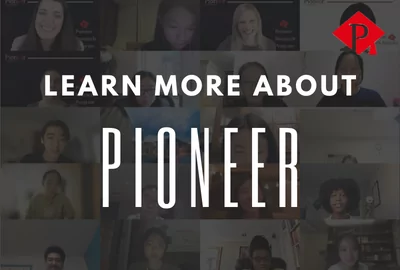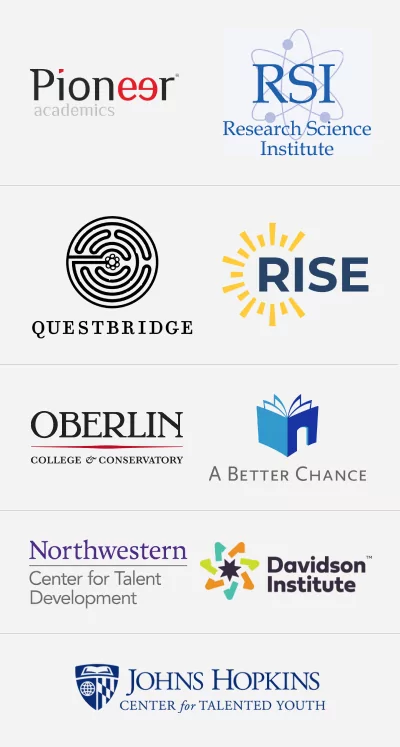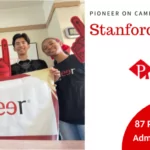When Ethan (psychology, 2019) applied to Pioneer, he knew he was interested in psychology, immigrataion, and bilingualism. These interests motivated him to apply to the research areas of international relations, psychology, and culture studies. Pioneer’s admissions team placed him in a cohort focused on the psychology of immigration. During his cohort sessions, he learned a new concept that combined his interests: language brokering, or translating by children for adults in immigrant families. This concept formed the basis of Ethan’s research topic.
Many Pioneer scholars go through a similar process; in fact, Pioneer’s academic system is designed this way on purpose. Pioneer’s academic placement process enables students to follow their passion and acquire deep knowledge on a subject even before they have acquired conventional prerequisite knowledge. In their applications, Pioneer scholars select up to four research areas and explain their interest in each. Then, the Pioneer admissions team conducts a holistic review of the application in order to determine an academic placement based on the student’s interests and background. Research areas are analogous to college majors––they are broad academic directions, like psychology or art history. Within research areas there are research concentrations, which are considerably more specialized, such as The Gut Microbiome and Women’s Rights in the Middle East and South Asia. These research concentrations are taught by qualified faculty mentors to small cohorts of students from all around the world, and they give Pioneer scholars the foundational knowledge they need to develop a research topic.
Research concentrations are designed to be a launchpad for creative research, not a constraint. Journey (neuroscience, 2019), a Pioneer scholar from the United States, says that her research concentration gave her helpful information but still allowed academic freedom in choosing a specific direction and forming a topic. She explains, “While the knowledge was extremely useful, I definitely was not told to alter what I wanted to research based on [my research concentration], and when I talked to my professor about what I specifically wanted to research and how that might relate to what we learned in class, he made sure that I could do that with the knowledge that was given, but also gave me the resources to make sure that I could tailor the different resources [to my interests].” Journey’s primary interests lie in engineering, but her placement in neuroscience allowed her to make connections between the two disciplines. This is often the case, as academic knowledge is inherently interdisciplinary and may have applications in many different settings.
Professor Snyder, a Pioneer faculty mentor in chemistry, believes that this academic model works well to quickly bring high school students up to the same academic level as college students, allowing them to do advanced research. “I would say that the only real difference between a first year [college] student and a student at Pioneer is experience. They’re both really talented, motivated groups of students,” she explains. “When I look at Pioneer, it’s about finding out what [the students’] baseline is, what they have learned and what they haven’t learned, and then figuring out how to move them to the next level so that they can compete with those students…. Because Pioneer is a really fast paced program, it can be a really great way to immerse the students so that they can rapidly bring themselves up to a point where they can compete with those students.” Pioneer’s academic concentrations are important for choosing a research topic because they allow students to acquire foundational knowledge very quickly.
The research concentration begins in a cohort setting, with students placed in small peer groups, and ends with one-on-one mentorship by a professor. Christos, a Pioneer from Greece (physics, 2019), believes that this structure allowed him to progress rapidly. “It’s Pioneer’s structure that you start out with your online classmates [in small group sessions] and then proceed to one-on-one mentoring,” he explains, “So it really starts out with something you’re used to coming from a high school setting, but you end up where you will be in ten years.” By meeting students where they are and then giving them a foundation in a specialized research concentration, Pioneer makes it possible for high school students to do authentic research.
While Pioneer scholars must choose and develop their own research topics based on their interests and passions, their choice is invariably shaped by the foundational knowledge they acquire in their research concentrations. Pioneer’s thoughtful academic placements ensure that Pioneer scholars are placed in research concentrations in which they will not only follow their passion but deepen their interest in a given topic upon learning new concepts and ideas.


 Doing research is commonplace.
Doing research is commonplace.


